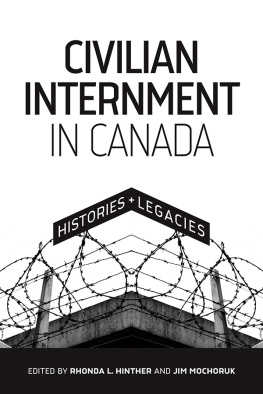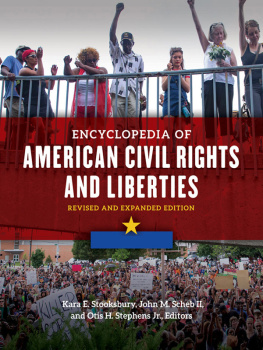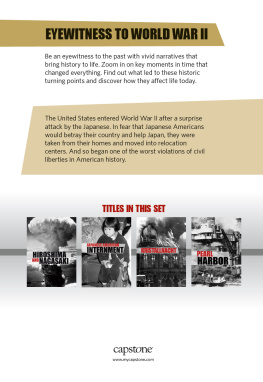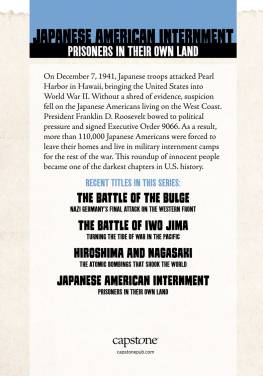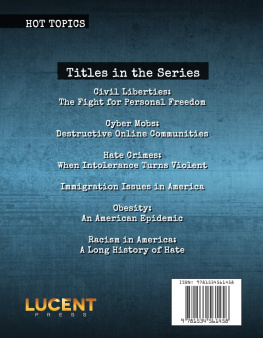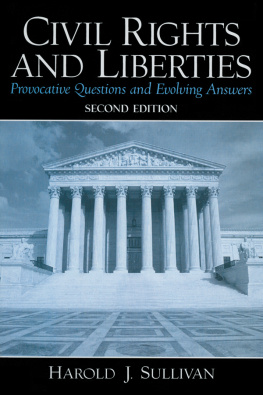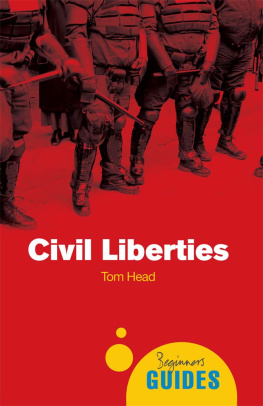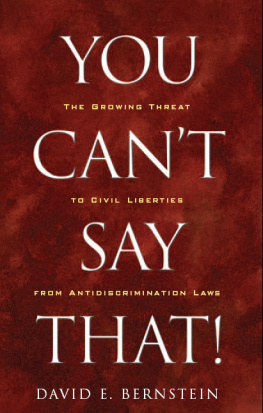CIVILIAN INTERNMENT
IN CANADA
Human Rights and Social Justice Series
ISSN 2291-6024
Editors: Karen Busby and Rhonda Hinther
2 Civilian Internment in Canada: Histories and Legacies , edited by Rhonda L. Hinther and Jim Mochoruk
1 The Idea of a Human Rights Museum , edited by Karen Busby, Adam Muller, and Andrew Woolford
CIVILIAN INTERNMENT
IN CANADA
HISTORIES AND LEGACIES
EDITED BY RHONDA L. HINTHER AND JIM MOCHORUK
Civilian Internment in Canada: Histories and Legacies
The Authors 2020
24 23 22 21 20 1 2 3 4 5
All rights reserved. No part of this publication may be reproduced or transmitted in any form or by any means, or stored in a database and retrieval system in Canada, without the prior written permission of the publisher, or, in the case of photocopying or any other reprographic copying, a licence from Access Copyright, www.accesscopyright.ca, 1-800-893-5777.
University of Manitoba Press
Winnipeg, Manitoba, Canada
Treaty 1 Territory
uofmpress.ca
Cataloguing data available from Library and Archives Canada
Human Rights and Social Justice Series, ISSN 2291-6024 ; 2
ISBN 978-0-88755-845-0 (PAPER)
ISBN 978-0-88755-593-0 (PDF)
ISBN 978-0-88755-591-6 (EPUB)
ISBN 978-0-88755-594-7 (BOUND)
Cover design by Michael Carroll
Interior design by Karen Armstrong
Printed in Canada
This book has been published with the help of a grant from the Federation for the Humanities and Social Sciences, through the Awards to Scholarly Publications Program, using funds provided by the Social Sciences and Humanities Research Council of Canada.
The University of Manitoba Press acknowledges the financial support for its publication program provided by the Government of Canada through the Canada Book Fund, the Canada Council for the Arts, the Manitoba Department of Sport, Culture, and Heritage, the Manitoba Arts Council, and the Manitoba Book Publishing Tax Credit.
Contents
Rhonda L. Hinther and Jim Mochoruk
Dennis Edney
Jodi Giesbrecht
Kassandra Luciuk
Jim Mochoruk
Marinel Mandres
Travis Tomchuk
Christine Whitehouse
Rhonda L. Hinther
Aya Fujiwara
Mikhail Bjorge
Grace Eiko Thomson
Clemence Schultze
Myron Momryk
Ed Caissie and Todd Caissie
Emily Cuggy and Kathleen Ogilvie
Sharon Reilly
Paula J. Draper
Judith Kestler
Franca Iacovetta
Art Miki
Introduction
RHONDA L. HINTHER AND JIM MOCHORUK
Eleven-year-old Myron Shatulsky missed seeing his beloved father, internee Matthew Shatulsky, by a mere two hours when the train transferring Matthew and his comrades from the internment camp in Kananaskis, Alberta, to one at Petawawa, Ontario, passed through Winnipeg earlier than anticipated on a July day in 1941. Myron had not seen his father since the RCMP hauled him away the year before, as part of what historian Reg Whitaker has termed the Canadian governments official repression of communism during the war. When we came to the station and heard that the train had [gone]no need to write how we felt, said Matthews wife Katherine in her next letter to him. The poor boy has so many scars on his heart to heal that he will remember for the rest of his life.
Now in his eighties, Myron Shatulskys experiences of the internment years and their impact on his family and community serve as a powerful reminder of the fragility of civil liberties and human rights. His story is part of a larger, complexand contestedconversation on civilian internment in Canada. Internment has affected persons from a variety of political backgrounds and racialized and ethnocultural communities, during times of war and perceived war, with the most well-known being the internments of those of Japanese, Ukrainian, and Italian descent. Experiences of arrest, internment, and displacement remain deeply felt by former internees and their kin.
Modern Canada has an unfortunately rich and shameful record of violating civil rights and liberties through the employment of civilian internment. This is a complicated and, at times, messy and confusing story encompassing arrest, displacement, and confinement. And this story spannedand still spanswar and peacetimes, having affected persons from a wide variety of political backgrounds and ethno-cultural communities. Civilian internment in this country has not been widely discussed, particularly in comparative ways, despite the well-known impounding of tens of thousands of Japanese, Ukrainians, assorted eastern Europeans, Germans, and Italians as enemy aliens during the two world wars, and in spite of the deeply rooted experiences of those directly affected and their kin, as Myron Shatulskys experience highlights.
In a dictionary sense, internment can be simply defined as the state of being confined as a prisoner without formal charge and conviction, with persons typically incarcerated for political or military reasons. But, as this collection indicates, such a strict definition is too limited for what transpired in Canada. During the Great War (19141918), over 5,900 eastern Europeans, primarily from the Austro-Hungarian Empire, Approximately 80,000 more were forced to register with, and report on a regular basis to, local authorities. And even after the wartime emergency ended, the Canadian state managed to transfer to other forms of legislation many of the powers of the War Measures Act, which had allowed it to imprison and deport dangerous foreignersand others whose views the state disliked or feared.
As Reg Whitaker, Greg Kealy, Andrew Parnaby, and Dennis Molinaro have pointed out, for most of the interwar period, even when the War Measures Act was not in operation, the civil liberties of many Canadians, but especially those of Canadas ethnic leftists, were at great risk.
During the Second World War, using the newly enacted Defence of Canada Regulations, federal authorities, in league with local governments, the RCMP, and local police, worked to intern a diverse array of groups. Japanese Canadians (including men, women, and children), were forcibly relocated from the West Coast, and enjoy the dubious distinction of surpassing all other groups in terms of numbers affected (over 20,000 individuals were evacuated), loss of property, and the devastating effects on the community and individuals. Hundreds of persons of Italian and German descent were also incarcerated without charge, largely for their alleged pro-fascist and pro-Nazi political orientations. Over a hundred Communists and pro-Communists, many of whom were so-called ethnic hall socialists, were also rounded up and interned in 1940 and most remained incarcerated well after the Soviet Union became an ally in the summer of 1941. As several of the contributions to this volume note, Canada also played host to internees on behalf of Britain; among these were German merchant marines, Italian nationals, and a sizable number of European Jews who, despite being early victims of Nazism, were arrested and interned in Britain after the outbreak of the Second World War because they were German nationals. While the common current uniting the internment of these disparate groups was ostensibly a concern for national security and the successful prosecution of the war effort, scholars and others have demonstrated (both in this collection and elsewhere) that in most cases these were not the real reasons these groups were targeted. Rather, wartime served as the perfect excuse to ramp up the racist targeting of groups like the Japanese Canadians. It is no exaggeration to say that ever since the earliest community members arrival, the lives of Japanese Canadians had been unequally regulated and circumscribed by formal and informal racist manoeuvring on the part of white government officials, union members, citizens groups, and others. Likewise, national security had little to do with the targeting of the far left; rather, federal and local authorities seized it as an excuse to thwart communist and pro-communist activism in Canada once and for all, making use of the Defence of Canada Regulations to sidestep legitimate legal process that would haveat least potentiallyoffered some possible semblance of justice served and the accompanying risk that these radicals might be acquitted if charged.

